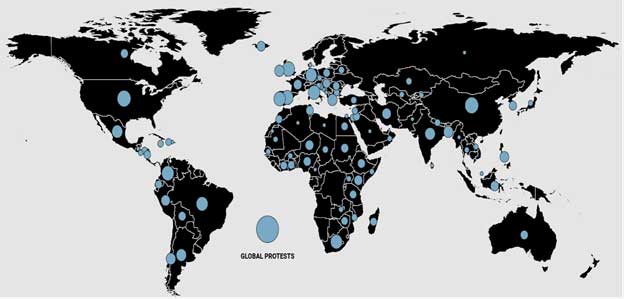NEW YORK, Jan 13 (IPS) – This week world leaders meet in Davos to discuss cooperation to address multiple crises, from COVID-19 and escalating inflation to slowing economic growth, debt distress and climate shocks.
Only three months earlier, finance ministers had gathered in Washington DC for the same reason. The mood was grim. The need for ambitious actions could not be greater; however, there were no agreements, evidencing the fragility of multilateralism and international cooperation.

Worse, policy makers -advised by the International Monetary Fund- are resorting to old, failed and regressive policies, such as austerity (now called “fiscal restraint” or “fiscal consolidation”), instead of much needed corporate/wealth taxation and debt reduction initiatives, to ensure an equitable recovery for all.
A recent global report alerts of the dangers of a post-pandemic wave of austerity, far more premature and severe than the one that followed the global financial crisis a decade ago. While governments started cutting public expenditures in 2021, a tsunami of budget cuts is expected in 143 countries in 2023, which will impact more than 6.7 billion people or 85% of the world population.
Analysis of the austerity measures considered or already implemented by governments worldwide shows their significant negative impacts on people, harming women in particular. These austerity policies are:
- targeting social protection, excluding vulnerable populations in need of support by cutting programs for families, the elderly and persons with disabilities (in 120 countries);
- cutting or capping the public sector wage bill, this is, reducing the number and salaries of civil servants, including frontline workers like teachers and health workers (in 91 countries);
- eliminating subsidies (in 80 countries);
- privatizing public services or reforming state-owned enterprises (SOEs) in areas such as public transport, energy, water;
- reforming hard-earned pensions by adjusting benefits and parameters, resulting in lower incomes for retirees (in 74 countries);
- (6) labor flexibilization reforms (in 60 countries);
- reducing employers’ social security contributions, making social security unsustainable (in 47 countries);
- and even cutting health expenditures despite COVID-19 is not over.
Austerity and all the human suffering it causes is evitable, there are alternatives. There are at least nine financing options, available even in the poorest countries, fully endorsed by the UN and international financial institutions, from increasing progressive taxation to reducing debt. Policymakers must urgently look into these. Many countries have already implemented them.
In recent years, citizens have protested austerity all around the world. A recent study on world protests shows that nearly 1,500 protests in the period 2006-2020 were against austerity. Citizens demand better public services, social protection, jobs with decent wages, tax and fiscal justice, equitable land distribution, and better living standards, among others. Protests against pension reforms, and high food and energy prices have also been very prevalent. Recently, the jobs and cost-of-living crises have been accentuated by the COVID-19 pandemic, resulting in more protests despite lockdowns.
The majority of global protests against austerity and for economic justice have manifested people’s indignation at gross inequalities. The idea of the “1% versus the 99%,” that emerged a decade ago during protests over the 2008 financial crisis, has spread around the world, feeding grievances against elites and corporations manipulating public policies in their favor, while the majority of citizens continue to endure low living standards, aggravated by austerity cuts.
Let’s remember that trillions of dollars have been used to support corporations during the pandemic and to support military spending. Now people are being asked to endure austerity cuts, at a time when they are suffering a cost-of-living crisis. The 2023 meetings in Davos are being faced with new protests and demands to tax the rich.
Unless policymakers change course, we shouldn’t be surprised to see increasing waves of protests all over the world. Clashes in the street are likely to intensify if governments continue to fail to respond to people’s demands and persist in implementing harmful austerity policies.
Governments need to listen to the demands of citizens that are legitimately protesting the denial of social, economic and civil rights. From jobs, public services and social security to tax and climate justice, the majority of protesters’ demands are in full accordance with United Nations proposals and the Universal Declaration of Human Rights. Leaders and policymakers will only generate further unrest if they fail to act on these legitimate demands.
Isabel Ortiz is Director of the Global Social Justice Program at Joseph Stiglitz’s Initiative for Policy Dialogue at Columbia University, former Director at the International Labour Organization (ILO) and UNICEF.
Sara Burke is Senior Policy Analyst at Friedrich-Ebert-Stiftung (FES) New York
IPS UN Bureau
Follow @IPSNewsUNBureau
Follow IPS News UN Bureau on Instagram
© Inter Press Service (2023) — All Rights ReservedOriginal source: Inter Press Service
Check out our Latest News and Follow us at Facebook
Original Source

